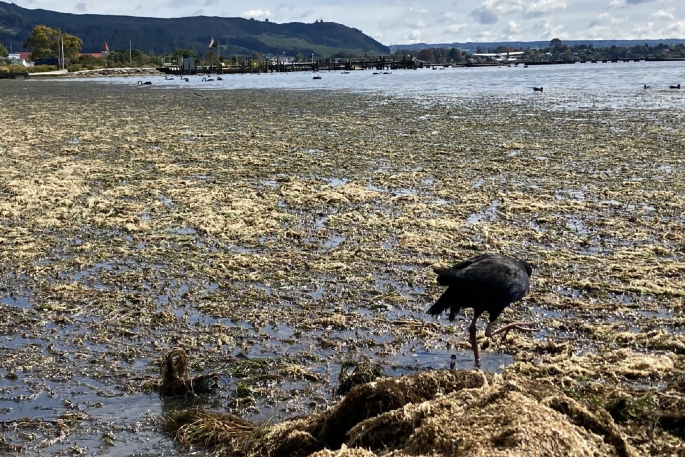Rotorua's lakefront has been blanketed by rotting lake weed, with one passerby calling the odour "rancid".
Recent stormy weather has washed ashore swathes of the now decaying weed, similar to the 2022 incident that resulted in 300 tonnes of it being removed costing ratepayers $35,000.
Local Democracy Reporting headed down to the lakefront and spoke to Jeff Lancaster who was visiting from Auckland.
While he and his family had been having a good time in the "wonderful" city, and at the lakefront playground, he says it was difficult to ignore the stench.
"The smell is quite rancid."
Bay of Plenty Regional Council Rotorua catchments manager Helen Creagh says lake weed was detached and washed ashore by stormy conditions.
The regional council, along with Rotorua Lakes Council and Te Arawa Lakes Trust, aims to remove the weed washed ashore by early this week.
"Lake weed wash-ups like this one at the lakefront are a public amenity issue."
.jpg) The smell is not impressing residents or visitors to the major tourist centre. Photo: LDR / Andrew warner
The smell is not impressing residents or visitors to the major tourist centre. Photo: LDR / Andrew warnerHelen says lake weed wash-ups would continue, as investment in lake weed control is insufficient to remove the weed beds from the district's lakes.
"More investment in this could significantly improve the issue and we hope that a business case being developed will increase investment - thereby improving public and private amenity and protect and improve aquatic biodiversity and cultural values."
.jpg) Smelly Lake weed at the Rotorua Lakefront. Photo / Andrew Warner Photo: LDR / Andrew Warner
Smelly Lake weed at the Rotorua Lakefront. Photo / Andrew Warner Photo: LDR / Andrew WarnerLand Information New Zealand is responsible for the management of lake weed beds and Te Arawa Lakes Trust carries out the work on its behalf.
Te Arawa Lakes Trust chief executive Dr Daryn Bean says it is through its initiatives and recent aquatic weed management programme it strives to ensure a future where rotomoana and taonga species thrived.
"Including the echoing footsteps of our kōura or freshwater crayfish as a symbol of water quality success."
Dr Bean says the work is a collaborative effort involving local authorities, environmental agencies, and "more importantly our community".
"We address lakeweed, like hornwort, through removal programmes aimed at reducing nitrogen levels and improving water quality. Our preventative measures include mātauranga ā-hapū to inform regular weed harvesting to mitigate environmental issues such as odour and ecological disruption."
He says the recent surge of lakeweed underscored the importance of its efforts.
Rotorua Lakes Council group manager infrastructure and environment Stavros Michael says it had not received any complaints of lake weed in the past month.
"The weather forecast for next week is likely to see the wind change to a southerly which will also help with the clean-up effort."
LDR is local body journalism co-funded by RNZ and NZ On Air.




0 comments
Leave a Comment
You must be logged in to make a comment.